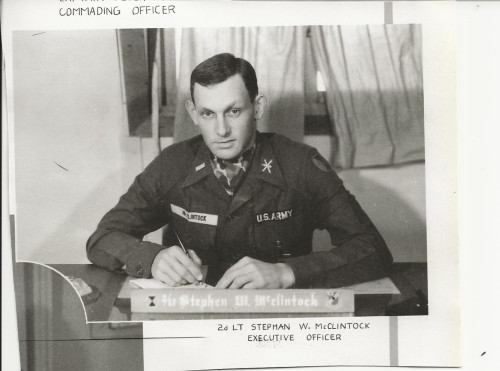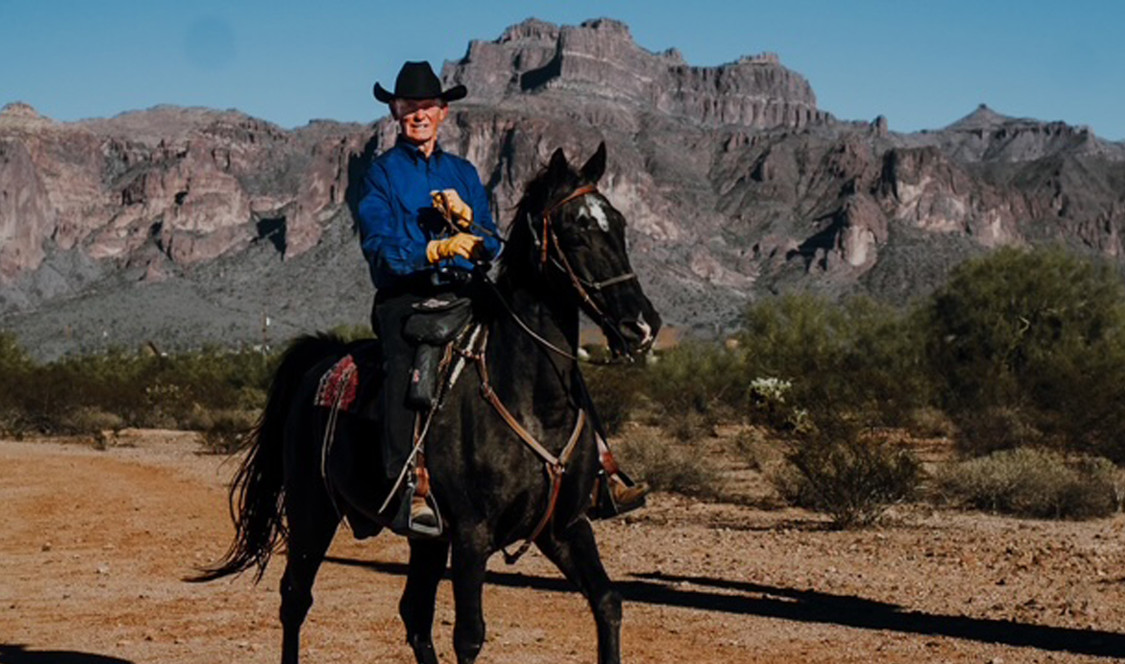As the Executive Officer of his Battery in Korea, one of Steve McClintock’s first assignments was to inspect the mess hall. He noticed a room in the back with triple locks. Steve asked what was in the room. The Mess Sergeant smiled and said: “Sir, it’s Coin of the Realm.” “Which means what?” asked Steve. “Sir, it’s all coffee.” The Sergeant told him that he trades for extra hams, turkeys, bacon, fruit, canned pumpkin, sugar and more. He told Steve that B Battery always has the best Thanksgiving and Christmas dinners, and he should invite the Battalion Commander to join them for the holidays. Steve learned a valuable Army lesson about negotiating, bartering, setting terms and striking good bargains for both sides.
As he sits on his black roan Tennessee Walker, “Ranger,” Steve McClintock ’64, reflects on his wide-ranging thirty-two career as a Reserve Army Officer and thirty-six-year career as a Senior International Financial Executive with Citibank. The horse was a gift from his wife, Kathy, upon his retirement from Citibank in 2004. Steve grew up riding horses. Retirement brought the opportunity to own a beautiful animal and enjoy the riding trails near his home in Mesa, Arizona. The couple chose Mesa as it met all their requirements for retirement: no snow, no humidity, no earthquakes, no tornadoes, and no mosquitoes. They were comfortable with the environment after a rewarding six-year stint in Saudia Arabia as General Manager, Chairman of Credit Policy, and Secretary to the Managing Director’s Committee at the Saudi Arabian Monetary Authority (Central Bank). Saudi American Bank was the second largest bank in Saudi Arabia. It was one of the most rewarding assignments of his career, one spent entirely with Citibank.
Thinking back on his time at CMC, Steve reminisces about having a conversation with the ROTC Professor of Military Science (PMS) about his performance at summer camp in Ft. Lewis, WN, at the end of his junior year. He performed extremely well, and the senior officer encouraged him to consider a career in the Army. Up to this point, Steve had not thought much about the military, although his father, an Armor Officer, had served with General George Patton’s 2 Armored Division. Steve pursued his military studies at CMC and finished as a Distinguished Military Graduate (DMG) and Outstanding Senior Cadet which allowed him to have his first choice of branch. He chose Armor and got Artillery - a typical response by the Army.
As a brand-new second lieutenant, Steve found himself at Ft. Sill, Oklahoma undergoing the Basic Field Artillery Course. In 1964, he and his classmates all expected to be assigned to Vietnam at the conclusion of training, but many received orders to Korea and Germany to replace officer vacancies at overseas bases. Steve ended up in an artillery battery in Korea near the Demilitarized Zone (DMZ). His father’s advice to the young officer was: “Always be decisive as there are a lot of flattened squirrels in the middle of the road.” He took the advice to heart and rapidly learned the practical basics of being a Forward Observer (FO). He was assigned to support an infantry company patrolling along the DMZ and was amazed when his soldiers casually waved at the North Korean soldiers on the other side of the fence!

He excelled as the Executive Officer (XO) of his 105mm Howitzer Battery, taking swift action to work with his noncommissioned officers (NCOs) to scrounge spare parts, to bring his battery to combat readiness status, and ensure the unit passed the Army’s annual proficiency test. He became a Battery Commander while in Korea.
Steve attributes the leadership lessons learned in the Army -- while on active duty in Korea -- to much of his success in a remarkable thirty-six-year career with Citibank. He grew up fast and learned important management skills that helped later in his banking career. Steve believes that to be an effective leader, one must follow some basic principles:
- Effective leaders do not accept the status quo; they do something about it. Lazy thinking and acceptance of “that’s the way things are” is not acceptable.
- Effective leaders solve their own problems. Always read the fine print, understand the rules of the game, and have backup plans B and C.
- Effective leaders trust their subordinates after they have earned that trust. Be judicious when giving praise to subordinates and make sure they know you have their back.
- Trust your instincts. If something seems off, not right, or just smells, action needs to be taken immediately. Become an expert in problem recognition and remedial management.
- Take pride in your work and develop a reputation for someone who can be counted upon. Always improve your skills, training, and education. Commit to Lifelong Education.
- Learn to effectively manage available manpower and anticipate the possibility of future staffing problems. Mitigate the downside, create a new upside. Be a mentor.
- Understand supply chain management and logistics - crucial to any large organization.
Always choose to attack the most difficult 2-3 problems with speed and momentum. Lesser problems can wait for resolution. Tackle the tough ones first before they “mushroom” into more serious, less controllable issues.
Steve took two R&Rs during his time in Korea, one week spent in Japan and the second in Hong Kong. These trips caused him to be bitten by the international travel bug. He enjoyed foreign countries and developed a yearning that motivated his civilian career. Returning to Ft. Sill, OK, in April 1965, Steve performed the job of an Operations Officer at the Regimental level for six months, a major’s slot, and received the Army Commendation Medal for efficiently and effectively managing the Regimental firing schedule requiring extensive communication and coordination.
After leaving active duty in late 1966, Steve earned an MBA in finance in 1968 at the Haas School of Business, part of the University of California in Berkely, CA, using the GI bill. Upon completion, his desire for an international assignment guided his choice to join Citibank’s International Group, Asia-Pacific Division in New York. Citibank had operations in over 100 countries. Here follows a record of his subsequent assignments throughout his banking and reserve officer career:
- 1969 - managed international trade Operations in Singapore (125 people),
(part of Regional BIMS office) including Brunei, Indonesia, Malaysia, and Singapore.
- 1972 – managed Operations in Jakarta, Indonesia (250 people).
- 1974 – transferred to Citibank, San Francisco to lead the Correspondent Bank Business for Singapore, Malaysia, Indonesia, Honk Kong, Taiwan, and India. Also Joined the 445 Civil Affairs/Military Government Company as a Captain in the reserves.
- 1976 – started Command/General Staff School, completed 1980 (Commandant’s List).
- 1977 – joined the 91st USA Maneuver Training Command, Pleasanton CA, 6th Army
- 1978 – transferred to National Banking Group in NYC and was promoted to Vice President. Joined the 78th USA Maneuver Training Command at Ft. Dix, NJ.
- 1981 – transferred to Minneapolis Regional Office responsible for all corporations, banks, and insurance companies in a six-state area. Joined the 205th Light Infantry Brigade at Ft. Snelling, Minneapolis and served as G-5 on the Brigade Staff.
- 1983 - promoted to Lieutenant Colonel and Battalion Commander of 360 PSYOPS Battalion at Ft. Snelling. MN and received his first Meritorious Service Medal for successful completion of the Battalion’s Army Training Test.
- 1985 – transferred to Citibank’s Headquarters for Middle East/Africa (MEAD) in Athens Greece. Headed Business Risk Review Group for MEAD’s 27 countries.
- 1988 – promoted to Assistant Division Credit Officer and Senior Credit Officer for Middle East/Africa Division in Athens.
- 1985-1991 – two-week, annual assignments with Headquarters of various Joint Command Units in Stuttgart and Frankfurt, Germany. Promoted to Colonel 1991.
- 1992 – assigned to Citibank in Helsinki, Finland as Managing Director. Rated top Foreign Bank in Finland 1992-1997.
- 1994 – retired from US Army Reserves and received second Meritorious Service Medal.
- 1997 – assigned to Saudi American Bank (SAMBA) in Riyadh as General Manager and Chairman of Credit Policy. SAMBA was Citibank’s 3rd most profitable overseas operation behind Brazil and London.
- 1999 – promoted to Level 1 Senior Credit Officer (only 30 in Citibank worldwide).
- 2004 – Retired from Citibank after 36 years.
Asked why he enjoyed such a successful career at Citibank, Steve offered the following from his personal skill set development list. Many of these skills can be attributed to his military training and service.
- I learned skills to negotiate good win-win business deals. For example, when negotiating with the Japanese I had to learn how to play golf and drink with them afterwards.
- I chose trusted officers and consultants who assisted me in areas where they had proven language, consulting, and management skills.
- I developed strong problem-solving skills and anticipated resource needs. I reached out to others in the Citibank system who had the right experience to help me.
- I tried always tried to anticipate problems and developed plans B and C for unintended consequences. Once a problem was recognized, I started remedial action immediately.
- I developed a business and military network of people I could call on for advice, direction, and recommendations. I developed and continuously nurtured my network and took every opportunity to write personal handwritten notes to nurture these relationships.
- I developed a reputation for getting things done efficiently and urgently.
Even in retirement, Steve continues to blaze new trails, riding his Tennessee Walker on backwoods trails, first as Chapter President and then as a National Director for Arizona’s Back Country Horsemen of America. BCHA has about 10,000 members in 31 states. It is a volunteer organization with the motto of “Keeping Trails Open for All.”

